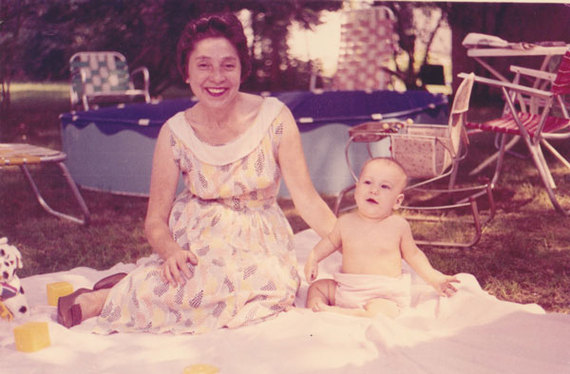In her lifetime, she witnessed the Russian Revolution, World Wars I and II, The Great Depression, the Holocaust, the Vietnam War, the crumbling of the Berlin Wall, the war in Afghanistan, September 11th and a few other events. Without an iPhone, undergoing Botox, owning a flat-screen TV, or joining Cross Fit, she was the strongest woman I have ever known.
At 18, I was nerdy and bookish teen, terrified of going to college. My parents, at a loss for how to comfort me, sent me to Grandma Elizabeth for invaluable wisdom. "Blaze a trail. Be like Joan of Arc. If I could do it, so can you."
"What do you mean?" I asked her, confused how Joan of Arc would prepare me for freshmen orientation.
She explained. "In the 1920's, I worked for Columbia Pictures. Back then I had to lie about the fact I was married and hide my pregnancy. You try going to work while being as big as a whale and trying to squeeze into a girdle."
"Wow," I murmured. It was something I hadn't considered.
"My boss didn't want to hire any woman who had a husband," she added. "Never mind we weren't encouraged to go to college. Now go learn something and be quiet."
I nodded, speechless. That was only the beginning of my real education -- the one I wouldn't find at a university.
Little did I know that Grandma Elizabeth was a martyr in her own right -- a woman who sacrificed her chances of a career or livelihood for others -- a woman on a fierce personal crusade.
Like so many of her generation who lived through the Great Depression, she was thrifty, acutely aware of the value and toil that went behind living in comfort. Even better, Grandma Elizabeth could smell an abandoned penny lying on a pavement miles away.
One day, I accompanied her shopping on the Lower East Side near her apartment in Manhattan. It was August. The streets were crowded with uncollected garbage, the piled wares of vendors, people rushing to get to work, and kids in summer camp holding hands in formation.
Suddenly, she stopped. "Don't move," she said. "Don't even breathe. You see that?" She was 90 at the time and gestured at the ground with her cane.
"See what?" A cluster of pigeons was feeding off abandoned breadcrumbs.
"That hidden treasure. There."
"What treasure?" All I saw were birds.
"Stay put. I'm going in."
"Grandma, what are you doing?" I was terrified that she was experiencing a memory lapse or becoming senile.
Ditching her cane against a near-by tree, she moved with purpose, making her way to the center of where the pigeons were clustered and squatting down beside them.
I was mortified. Bystanders stopped to gawk. I became uncomfortable and prayed she wasn't going to try to communicate with the birds. But when they scattered, flying away in a grey cloud, she picked up a penny.
"Look," Grandma Elizabeth cried, waving it in the air. "To the victor go the spoils."
I blinked at the coin thinking I had missed something. "Grandma, it's a penny." I rushed over to help her to her feet but she shooed me away.
Brushing breadcrumbs from her knees and grabbing her cane, she hoisted herself upright and tucked the penny inside one of her voluminous pockets. "This," she patted her side proudly, "is worth fighting for."
People were staring. "Grandma, what do you mean?"
"How do you think scholarships are built?"
I had no idea what she was talking about.
"This here is college tuition. One penny at a time."
I thought she had gone crazy -- huddling next to a flock of New York City pigeons in order to extract money from a sidewalk. But when she died, five grandchildren and five great-grandchildren had enough inheritance to go to college.
But the best memory I have of her is when my Grandpa Max passed away.
She had been married 70 years when her husband died. As the family gathered for Grandpa Max's funeral and the eulogy was read, without warning, Grandma Elizabeth broke formation. Unassisted, she climbed over the railing and walked to the gravesite, peering at it sternly. Then she took a few paces, surveying the area.
The family gasped, the speech came to a halt, and the funeral personnel were astounded. "So, where am I?" she asked the gravedigger.
He stared at her in stunned silence. My family shuffled awkwardly.
"Where am I going to be?" she demanded.
"Grandma," my father began gently, "come stand here with us, let's--"
She turned. "I just want to inspect my apartment. I want to make sure that I can fit comfortably." She probed and prodded, made faces at the clumps of dirt and then, smiling, hopped triumphantly back over the fence. "I'm going to be fine," she told us.
None of us have ever doubted her.
Earlier on Huff/Post50:

